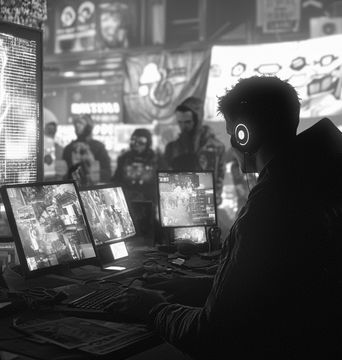HASBRO CEO REVEALS USE OF AI IN GAME DEVELOPMENT AMID SUBSIDIARY SCANDAL: DUNGEONS & DRAGONS AND MAGIC AFFECTED!

In an unexpected announcement at a Goldman Sachs conference, Hasbro CEO, Chris Cocks, acknowledged that the iconic toy and game company makes use of artificial intelligence (AI) in its game development process. This marked a significant shift in strategy and vision at the firm, which is best known for classic board games such as Cluedo and Monopoly as well as popular titles like "Dungeons & Dragons" and "Magic: The Gathering."
Cocks made it clear that Hasbro envisions a more cohesive integration of AI into their development process. Highlighting AI's potential for aiding in knowledge work and game development, he gave a glimpse into the role this technology is playing in redefining how games are conceptualized, designed, and played. The CEO indicated AI's extensive use in campaign and character development, hinting at a future where AI becomes a regular part of gameplay experiences across gaming circles.
This revelation paints a compelling picture for Hasbro's future initiatives, and the broader applications of AI across the organization's multitude of brands. According to Cocks, these applications may be pivotal in enabling user-generated content and simplifying the introduction of new players. However, the most intriguing element is arguably the prospect of AI-enabled emergent storytelling, which could revolutionize player immersions and experiences, demonstrating AI's potential to fuel innovative gameplay and narrative structures.
The announcement assumes significant importance, given the recent controversy at Wizards of the Coast (WOTC) - a subsidiary of Hasbro that faced criticism for banning artists from using AI, only to later confess to the usage of AI for creating an ad for the game "Magic." An explicit statement in one of the company's FAQs, positioning themselves in opposition to AI, had earlier fueled the flames of a brewing scandal. This contradiction, between stated ethos and operational practices, has raised eyebrows and earned criticism from fans.
As we look towards the future, the landscape for game design and development starts to appear dramatically different, a vista of promise tempered by perplexing contradictions. The door has been swung wide open for the advent of AI as a serious player in the gaming universe. As Cocks' announcement demonstrated, AI's potential is already being leveraged in key areas of game development, despite the growing pains.
However, the contradictory actions by WOTC present a confusing narrative that suggests the gaming industry might not be as ready to wholly embrace AI as Hasbro's CEO might have us believe. It leaves space for speculation about the extent to which AI can or would be integrated into the creative process. It forces us to consider how organizations secure the appropriate balance between ethical responsibility, creative integrity, and the power of machine learning. Going forward, this narrative will undoubtedly influence the policies and practices adopted by other industry players.
It is clear, though, that AI is no longer just the realm of computer scientists and tech giants. The announcement from Hasbro firmly puts AI on the gaming industry's table, paradigms shifting and all. As we enter this brave new world of AI-driven game development, one can only wonder at the implications for both the creators and the players in the future.